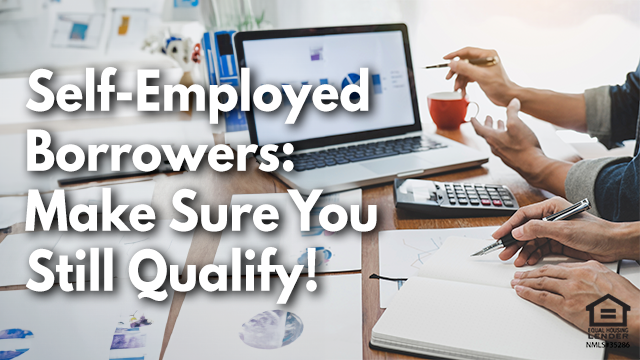Self-Employed Borrowers Who Filed for a Tax Extension: Make Sure You Still Qualify!

Entrepreneurs, freelancers, and independent contractors enjoy the freedom to manage their work; however, when it comes to securing a mortgage, the financial landscape for self-employed individuals can be quite different and sometimes challenging.
Freddie Mac recently released updated guidelines for self-employed borrowers. If you are a self-employed borrower who filed for a tax extension this year, give us a call to make sure you still qualify for the home you want!
Why Self-Employed Borrowers Face Unique Challenges
Traditional lenders typically prefer applicants with consistent and predictable earnings. For self-employed individuals, whose income can be irregular, proving financial stability over the long term becomes crucial. The very tax benefits that make self-employment attractive can also make it difficult to qualify for a mortgage.
How Your Tax Returns Affect Your Mortgage Eligibility
Tax deductions, while advantageous for reducing tax liabilities, can significantly lower reported income. This reduction can make it appear that self-employed borrowers may struggle to meet regular mortgage payments.
Unlike salaried employees who can easily provide pay stubs as proof of income, self-employed individuals often face the need to submit additional documentation. This can include tax returns from multiple years, profit and loss statements, and bank statements, potentially making the mortgage application process more complex and time-consuming.
Freddie Mac Updates Extension Guidelines for Self-Employed Borrowers
Freddie Mac updated their guidelines for mortgage applications from self-employed individuals who cannot provide their current tax returns due to an extension filing.
If you have a filed for an extension for the most recent tax season, be aware that your lender may request the following:
> A review of your most recent financial statements covering the period since your last tax filing.
> Three months or more of your business bank statements
> Signed IRS Form 941, Employer’s Quarterly Federal Tax Return, for the prior and current calendar year quarter(s) supporting wages and other compensation.
> Any tax liabilities reported with IRS filing extensions to ensure consistency with prior years' tax returns
> Examination of W-2s, 1099s, and/or K-1s from the most recent calendar year, if available.
If your income stability cannot be determined through these methods, lenders may still require the most recent calendar year’s tax returns to assess your eligibility.
Alternative Mortgage Options for Self-Employed Borrowers
The mortgage industry has developed specialized loan products to help better accommodate self-employed borrowers:
Alternative Documentation Loans
For those lacking traditional documentation like W-2s and pay stubs, alternative documentation loans may provide a solution. These loans allow self-employed borrowers to demonstrate their financial stability through bank statements or asset statements.
Bank Statement Loans
A specific subset of alternative documentation loans, bank statement loans use deposits and cash flow from personal and business bank statements over the last 12 to 24 months to assess income. While offering increased flexibility, these loans may come with slightly higher interest rates and might require larger down payments to offset the lender's perceived risk.
Closing Thoughts
Securing a mortgage while self-employed comes with its own set of potential challenges. However, with an understanding of the requirements and available options, self-employed professionals can navigate the mortgage landscape effectively.
If you are a self-employed borrower who recently filed for an extension or are looking for additional guidance to determine your mortgage eligibility, give us a call or visit us online today!